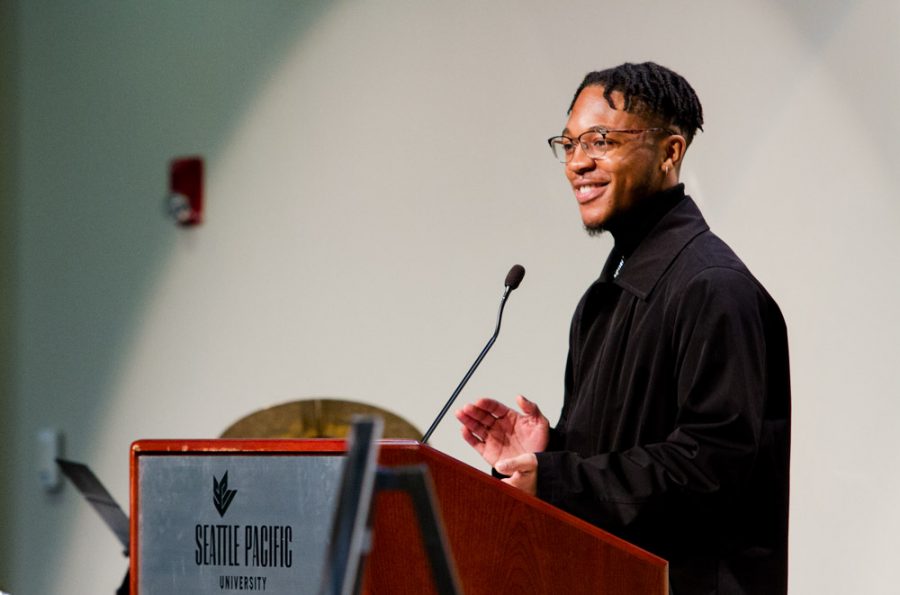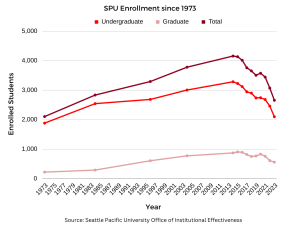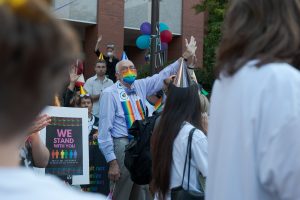Mixing lament and celebration
Anthony Hester, President of SPU’s Black Student Union, delivers a spoken word at the annual Rev. Dr. Martin Luther King Chapel service in Upper Gwinn on Tuesday, Jan. 21.
January 22, 2020
There were not nearly enough seats in Upper Gwinn to accommodate the gathered crowd for this year’s Martin Luther King Jr. Day chapel. Alongside the Black Student Union and African Student Association, the audience helped distribute extra chairs at the end of rows, trying to accommodate the overflowing crowd that had lined the walls in search of a seat.
Pricilla Onyedikachi Ozodo, Minister of Worship and Production at SPU, watched from the stage. “This,” she said, smiling, “is not a bad problem to have.”
The service, which included poetry, songs, panels of students, speeches, and biblical readings, highlighted the legacy of Reverend Dr. King, and its effects both historical and current. Students and faculty shared experiences, setting a tone of both celebration of successes and somber recognition of struggles.
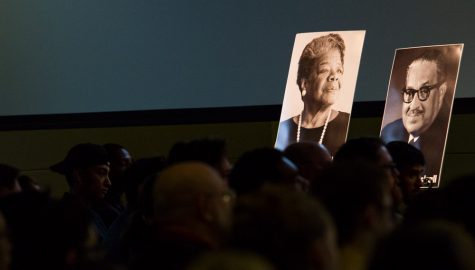
Posters of Maya Angelou and Thurgood Marshall were placed in front of the audience at the annual Rev. Dr. Martin Luther King Chapel.
“Parts of our service will be celebrating the great things that have already happened, and part of our service will be lamenting the hard things that are still happening,” said Ozodo. “One chapel is never enough to celebrate all that we have to say.”
This theme of both celebration and lament was expressed through the three interconnected sections of the service: “I was here,” which highlighted the work of historical activists like King; “I’m still here,” focusing on the experience of black students at SPU, and “Are you here with me?” which emphasized allyship.
In a student panel featuring senior Omni Lott, ASSP Vice President of Intercultural Affairs Aden Yilma, sophomore Mackenzie Nevarez and senior Ephie Siyum.
The students shared their experiences, and emphasized the importance of looking out for one another through good and difficult times alike.
“Black excellence is knowing that your presence and your actions represent more than yourself, that you are a part of a greater whole, a community of people, and it’s time for us to start supporting each other,” Lott said.
“Good times, tough times, no matter what, we are one people and it doesn’t include just black people, we all stand together.”
Siyum elaborated on that theme in her response to the same question.
“Succeeding together, as a community. We are brothers and sisters, and helping them get there…just because I’m succeeding doesn’t mean that I need to focus on me, I need to make sure you’re succeeding too,” she said.
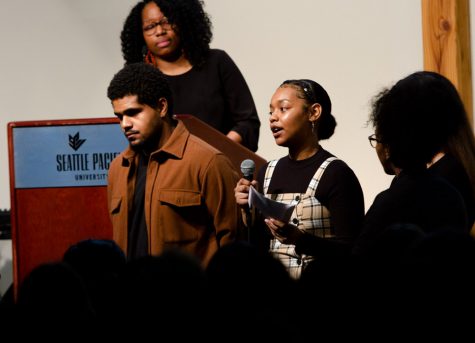
Aden Yilma, ASSP Vice President of Intercultural Affairs, speaks with a panel of students sharing their experiences with the difficulties of addressing racist comments and expectations.
In that vein, Lott discussed his experience on SPU’s campus, especially being in the ethnic minority and how that affected him. He said that he felt like an outlier at first, which was a challenge, but he uses that experience to lift up others.
“I think it brought me into [leadership] roles I wanted to be in, to make sure I am supporting my brothers and my sisters, and making sure that they have a face that they can look up to, and not be in the position I was in,” Lott said.
Yilma added onto that with her own experience, and the challenge of deciding how to address racist comments and situations.
“Hearing microaggressions everyday and thinking ‘should I speak up? Should I ignore it? Should I educate?” she said.
The panel also discussed allyship, and what students considered to be characteristics of a good ally.
DeHeavalyn Pullim, an SPU admissions faculty member, who was moderating the panel, commented on the importance of allyship.
“Allyship has always been there and always been necessary, we are never in this work alone, even if its been sparked by our leaders and we play a major role in this work, allyship — Dr. King had allies, we all need allies from time to time,” she said.
According to the panelists, a good ally comes with an open mind, acceptance, and with questions instead of assumptions, as Yilma stated. However, they also reminded the audience that demanding answers from people who likely have answered the same questions many times is unhelpful.
“Give us our space, but also know that that space helps us process through these things and we can better help ourselves,” explained Lott.
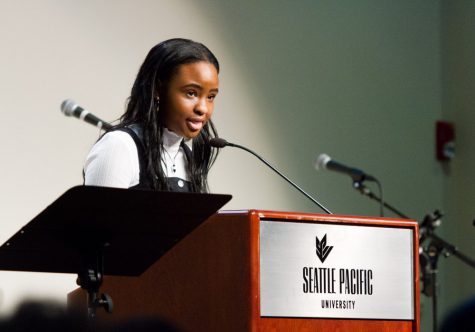
Emily Kasue takes to the podium to deliver a spoken word on Dr. King’s legacy and the ongoing struggle for justice.
Sophomore student Emily Kasue read a piece of her own spoken word poetry. It conveyed the experience of black Americans following King’s legacy and striving towards justice, though it is often challenging.
“Today I choose to live, and breathe, and love, knowing that we are still here. But today is just like yesterday, and tomorrow, because this race for justice continues for us,” Kasue read.
President of SPU’s Black Student Union Anthony Hester spoke on his own experiences on our campus, and challenged students and faculty alike to be better allies and come alongside our black student body.
“Throughout my time at SPU, I have encountered racism numerous times,” Hester said. “I have experienced racism in Gwinn, in the dorms, and in the classroom. It is very disappointing to say that I have been victimized by both students and faculty.”
Hester said that, while his experiences have been challenging at times, he uses them as fuel to motivate him. He encouraged other black students to also follow in King’s legacy of persistence.
“Reverend Dr. Martin Luther King Jr. had a vision, and it is our responsibility to carry out this vision; we are the change that we seek. But first, we must apply, apply, apply.”
















































































